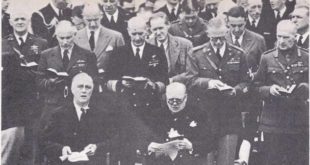In 1871 there occurred one of the strangest meetings in history. The place was Ujiji on Lake Tanganyika in the heart of Africa. The men who met were David Livingstone, a Scottish missionary who was also a doctor, and Henry M. Stanley, a newspaperman. Livingstone had come to Africa about thirty years before. Anxious to spread Christianity and civilization among the Africans, in this unknown and mysterious continent, he had undertaken long trips into the interior. For several years, however, Livingstone had not been heard from, so the New York Herald sent Stanley, a roving reporter, to look for him. …
Read More »Tag Archives: Morocco
Victory in Europe 1941 – 1945
Even before Pearl Harbour, there had been cooperation between the United States and Britain. In August of 1941, President Roosevelt and Prime Minister Churchill met secretly, on a cruiser at sea off the coast of Newfoundland. There they drew up the Atlantic Charter, a document stating the principles on which they based their hopes for a better future for the world. They pledged that neither country would seek more territory. They hoped that, “after the final destruction of Nazi tyranny,” all men in all lands could “live out their lives in freedom from want and fear,” and they called on …
Read More »The Coming of the Storm 1905 – 1913
ALREADY HEMMED in on two sides by France and Russia, the Germans were dismayed to see Great Britain join their rivals. They feared that they would be surrounded by unfriendly powers and they decided to test the Entente Cordiale. They were anxious to find out how strong it was and how far Great Britain would go in backing up its new ally. The place they chose for the showdown was Morocco, where the French, now with the approval of the British, were policing large areas and taking over territory and rights. So, in March of 1905, a German warship suddenly …
Read More »Storm Clouds over Europe 1882-1907
AS THE year 1899 drew to a close, Europeans and Americans began to wonder when, exactly, the nineteenth century would end and the twentieth century begin. Most people thought that this would take place at midnight of December 31, 1899, but historians disagreed. They pointed out that the first hundred years after the birth of Christ had ended with the final seconds of the year 100. Therefore, they said, the twentieth century would not begin until January 1, 1901. As they toasted the new century that New Year’s Day most people in Europe and America were satisfied and hopeful. Life …
Read More »Rivalries in the Middle East 1856 – 1912
THE MIDDLE EAST where Europe, Asia and Africa meet had long been known as one of the great crossroads of the world. Most of its people were Moslems, but among them were many Christians and Jews. They spoke languages as different as Arabic and Latin, Slavic and Turkish. They had little in common except that they were all subjects of the Ottoman sultan in Constantinople. The Ottoman Empire — so called after its early founder, Othman — was the last of several empires to rule over a large part of Islam. Unlike the earlier empires, it was dominated not by …
Read More »Islam the Civilizer A. D. 622-1406
IF Islam had never existed, the Christian countries of the world would probably be less advanced and certainly less varied, than they are. For it was Moslems who gave the West many of its basic skills and ideas. From the eighth to the thirteenth centuries, the Arabs and the other Islamic peoples were the main carriers of western civilization. While Europe was torn by almost constant fighting, Moslem scholars preserved the learning of the ancient world. Other Moslems added discoveries and original works of their own. In time, translators in the parts of Europe that were in closest contact with …
Read More »The Ottomans, the Last Great Islamic Power A.D. 1299-1922
ACCORDING to their tradition, the Ottoman Turks once belonged to the same Central Asian tribe as the Seljuk Turks. Their ancestors came to Asia Minor with the Seljuks. In time, they began to challenge the authority of their fellow Turks. The Ottomans took their name from a chieftain called Othman, who in 1299 became the emir of Seljuk lands bordering on the Byzantine Empire. Othman declared holy war on his Christian neighbours. His son Orkhan captured the city of Brusa and in 1362 Orkhan’s son Murad took Adrianople, beyond the strait and sea that separated Asia Minor from Europe. Thereafter, …
Read More »Rival Caliphs and Amirs in the West A.D. 750-1492
IN 750, when the first Abbasid caliph ordered a wholesale massacre of the family that had ruled before him, hardly any of the Omayyads came out alive. One who did was a twenty-year-old youth named Abd-al-Rahman, a grandson of the tenth Omayyad caliph. Fleeing from a Bedouin camp on the Euphrates, he wandered in disguise through Palestine, Egypt and North Africa. Again and again he barely escaped being discovered and seized by Abbasid spies. His desperate flight lasted, altogether, five years. Finally he came to the town of Ceuta, on the northwest coast of Africa, where some Berber chieftains, who …
Read More »






